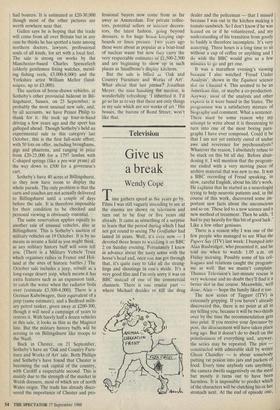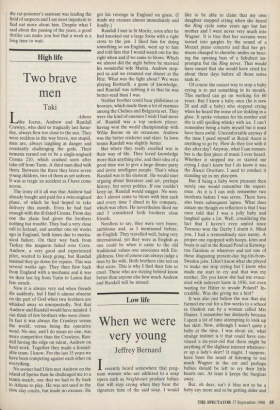Television
Give us a break
Wendy Cope
Time gathers speed as the years go by. Films I was still vaguely intending to see at the cinema are shown on television and turn out to be four or five years old already. It came as something of a surprise to learn that the period during which I had not got round to seeing The Godfather had lasted 16 years. Well, it's over now — I devoted three hours to watching it on BBC 2 on Sunday evening. Fortunately I knew in advance about the nasty scene with the horse's head and, once one nas got through that, it's quite easy to take all the strang- lings and shootings in one's stride. It's a very good film and I'm only sorry it was on BBC instead of one of the commercial channels. There is one crucial part where Michael decides to Rill the drug dealer and the policeman — that I missed because I was out in the kitchen making a tomato sandwich. So I don't know if he was leaned on or if he volunteered, and my understanding of his transition from goody to baddy is therefore incomplete. It's very annoying. Three hours is a long time to sit without a cup of coffee or anything and I do wish the BBC would give us a few minutes to go and get one.
It was a marathon evening's viewing because I also watched 'Freud Under Analysis', shown in the Equinox science slot on Channel 4. This seemed to be an American riim, or maybe a co-production. Anyway, most of the analysts and other experts in it were based in the States. The programme was a satisfactory mixture of biography and comment. What a sentence. There must be some reason why my attempt to write about it is threatening to turn into one of the most boring para- graphs I have ever composed. Could it be that I am not yet entirely cured of undue awe and reverence for psychoanalysts? Whatever the reason, I absolutely refuse to be stuck on this bit all day. Before aban- doning it, I will mention that the program- me ended with a very moving piece, of archive material that was new to me. It was a BBC recording of Freud speaking, in slow, careful English, about his life's work. He explains that he started as a neurologist trying to help neurotic patients and, in the course of this work, discovered some im- portant new facts about the unconscious and so on. These led to a new science and a new method of treatment. Then he adds, `I had to pay heavily for this bit of good luck.' Like a few other geniuses.
There is a reason why I was one of the few people who managed to see What the Papers Say (ITV) last week: I bumped into Alan Rusbridger, who presented it, and he told me when to watch: 1.05 a.m. on Friday morning. Possibly some of his col- leagues and relations caught the program- me as well. But we mustn't complain. Thames Television's last-minute rescue is very welcome and no doubt they'll find it a better slot in due course. Meanwhile, well done, Alan — hope the family liked it too.
The new series of Taggart (ITV) is extremely gripping. If you haven't already discovered this, there is no point at all in my telling you, because it will be two-thirds over by the time the recommendation gets into print. If you receive your Spectator by post, the denouement will have taken place long ago. But it doesn't do to dwell on the pointlessness of everything and, anyway, the series may be repeated. The plot constructed with admirable skill by writer. Glenn Chandler — is about somebody putting rat poion into jars and packets of food. Every time anybody eats anything, the camera dwells suggestively on the meal but mostly it turns out to have been harmless. It is impossible to predict which of the characters will be clutching his or her stomach next. At the end of episode one, the rat-poisoner's assistant was leading the field of suspects and I am most impatient to find out more about him. Despite what I said about the passing of the years, a good thriller can make you feel that a week is a long time to wait.



































































 Previous page
Previous page